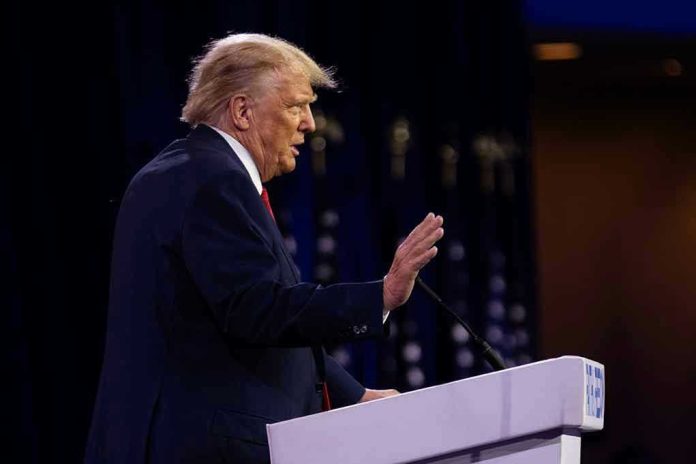
Kazakhstan’s leap into the Abraham Accords quietly rewrites the rules of regional power—yet few saw it coming, and even fewer grasp its real stakes.
Story Snapshot
- Kazakhstan becomes the first Central Asian nation to join the Abraham Accords, marking a new era in regional diplomacy.
- The announcement, delivered by Donald Trump, signals his renewed push to expand Middle East normalization efforts in his second term.
- The move could realign economic and strategic partnerships across Central Asia, Israel, and the U.S.
- Potential ripple effects may challenge the influence of Russia and Iran in the region.
Kazakhstan’s Unlikely Spotlight in Global Diplomacy
Kazakhstan, a nation more familiar to most as a land of vast steppes and resource riches, now holds the world’s gaze for an entirely new reason. On November 7, 2025, at the White House, Donald Trump announced that Kazakhstan would join the Abraham Accords—an agreement once limited to Middle Eastern and North African states. The revelation followed a three-way call with Israeli Prime Minister Benjamin Netanyahu and Kazakhstan’s President Kassym-Jomart Tokayev, establishing Kazakhstan as the first Central Asian country to take this diplomatic plunge. Official confirmation from Kazakhstan’s government just two days later cemented the country’s place in this expanding initiative. The speed and formality of these events raise pressing questions: Why Kazakhstan, and why now?
Kazakhstan’s participation is not a diplomatic afterthought. The move spotlights the nation’s strategic balancing act: maintaining ties with Russia and China while courting the West and Israel. For Trump, this achievement is a feather in his legacy’s cap—a visible win for U.S. influence and a signal that his vision of Middle East normalization now stretches deep into Eurasia. For Kazakhstan’s President Tokayev, the Accords offer economic promise and international prestige, as well as potential leverage in negotiating with larger powers that loom at its borders.
The Abraham Accords: Origins and Shifting Frontiers
The Abraham Accords, conceived in 2020, initially drew headlines for normalizing relations between Israel and Arab states like the UAE and Bahrain. Later, Morocco and Sudan followed, forming a pattern: each new member was a Muslim-majority country in the Middle East or North Africa. Kazakhstan’s entry shatters that pattern, bringing Central Asia into the fold for the first time. This development is more than symbolic. Kazakhstan’s secular governance and pragmatic foreign policy have long positioned it as a bridge between East and West. Now, these traits make it a logical—if surprising—candidate for this new chapter in diplomatic outreach.
Experts have suggested that Kazakhstan’s accession could set a precedent for other Central Asian nations, potentially creating a domino effect. By linking the region to Israel and, by extension, closer cooperation with the U.S., the Accords could reshape Central Asian alliances. The implications for trade, technology, and security are monumental. New deals in energy, agriculture, and technology may follow, providing tangible benefits for Kazakhstan’s economy and Israel’s outreach ambitions.
Stakeholders, Motivations, and the Shadow of Geopolitics
Donald Trump, now in his second term, seeks to cement the Abraham Accords as the flagship achievement of his foreign policy. Netanyahu, always alert to Israel’s regional standing, sees Kazakhstan as a gateway to broader acceptance and security. Tokayev leverages the moment to boost Kazakhstan’s global profile and attract investment. Yet, the unspoken tension remains: how will Russia and Iran, who have their own interests in Central Asia, respond?
Kazakhstan’s entry into the Accords could strain its longstanding balancing act with Moscow and Tehran. Critics warn that the move might provoke diplomatic pushback or economic pressure from these regional heavyweights. Supporters, however, contend that Kazakhstan’s pragmatic foreign policy—grounded in secularism and economic openness—makes it uniquely equipped to weather such storms. For now, official statements from Kazakhstan emphasize commitment to peace and cooperation, carefully sidestepping any overt antagonism toward neighbors who may view normalization with Israel less favorably.
A New Model for Regional Cooperation or a Precarious Gamble?
In the short term, Kazakhstan’s decision promises increased diplomatic engagement and the prospect of lucrative trade deals with Israel and the United States. Long-term, the move could inspire other Central Asian nations to reconsider their diplomatic alignments, potentially disrupting established spheres of influence. For the United States, the Accords now offer a new mechanism to project power and foster stability in a region often overlooked by Western policymakers.
Yet, caution tempers optimism. Analysts remind us that the details of Kazakhstan’s formal agreements have yet to be finalized. The possibility of backlash—from both domestic constituents and neighboring powers—cannot be ignored. Still, the consensus among diplomats and scholars is clear: Kazakhstan’s leap into the Abraham Accords rewrites the rules of engagement for Central Asia and signals a new era of possibilities for peace, commerce, and cooperation—one that will demand the world’s attention well beyond the next news cycle.
Sources:
Presidential Prayer Team, official statement on Kazakhstan joining the Abraham Accords













